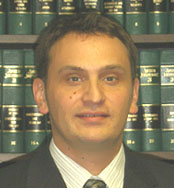

| THE SAINT PAUL PERSONAL INJURY ATTORNEY |
 |
 |
|
EMPLOYMENT - single-incident exception to emplyment misconduct definitionSTATE OF MINNESOTAIN COURT OF APPEALS A05-2470 Lee A. Pierce, Respondent, vs. DiMa Corporation (1992), Relator, Department of Employment and Economic Development, Respondent. Filed October 3, 2006 Affirmed Willis, Judge Department of Employment and Economic Development File No. 656705 Lee A. Pierce, #4 Cordoniz Court, Los Lunas, NM 87031 (pro se respondent) Warren E. Peterson, Peterson, Fram & Bergman, 50 East Fifth Street, Suite 300, St. Paul, MN 55101 (for relator) Linda A. Holmes, Department of Employment and Economic Development, First National Bank Building, 332 Minnesota Street, Suite E200, St. Paul, MN 55101-1351 (for respondent Department) Considered and decided by Willis, Presiding Judge; Ross, Judge; and Forsberg, Judge.* S Y L L A B U S A single violation of an employer’s cash-register policy that does not involve theft or the mishandling of funds is within the single-incident exception to the definition of employment misconduct in Minn. Stat. § 268.095, subd. 6 (2004). O P I N I O N WILLIS, Judge Relator employer challenges by writ of certiorari the decision of the senior unemployment-review judge (SURJ) that respondent employee did not commit employment misconduct and is not precluded from receiving unemployment benefits. Because we conclude that respondent’s single violation of relator’s cash-register policy did not constitute employment misconduct, we affirm. FACTS Relator DiMa Corporation, an adult-novelty store in Albert Lea, challenges the SURJ’s decision that respondent Lee A. Pierce did not commit employment misconduct when he violated DiMa’s cash-register policy. Pierce began working at DiMa in May 2001 as a “cashier sales clerk.” He was discharged in April 2005 for opening a cash register “in an improper manner.” DiMa’s general manager Mark Van Gelder testified that DiMa requires employees either to press the cash-total key or the no-sale key in order to open a cash register. Van Gelder testified that Pierce was discharged because he opened a cash register by using an emergency switch. Van Gelder testified that only managers are authorized to use emergency switches. Van Gelder discovered Pierce’s act by reviewing a security video during his investigation of the disappearance of a credit-card receipt. No money was taken from the cash register. Pierce testified that he was helping a new sales clerk look for a lost credit-card receipt and that he used the emergency switch to open the cash-register drawer to look for the receipt under the drawer. Pierce testified that he failed to use the no-sale key to open the cash register because he was “[n]ot quite thinking clearly.” An adjudicator with the Department of Employment and Economic Development determined that Pierce was discharged for employment misconduct and was thereby disqualified from receiving unemployment benefits. Pierce appealed, and an unemployment-law judge (ULJ) determined that Pierce was discharged for reasons other than employment misconduct. DiMa appealed the ULJ’s determination, and a SURJ also determined that Pierce did not commit employment misconduct and is not disqualified from receiving unemployment benefits. DiMa brings this certiorari appeal. ISSUE Did Pierce commit employment misconduct by violating DiMa’s cash-register policy? ANALYSIS On appeal from an unemployment-benefits determination, this court reviews the decision of the SURJ rather than the decision of the ULJ. Tuff v. Knitcraft Corp., 526 N.W.2d 50, 51 (Minn. 1995). The SURJ’s findings of fact are viewed in the light most favorable to the decision; if there is evidence reasonably tending to sustain them, they will not be disturbed. Schmidgall v. FilmTec Corp., 644 N.W.2d 801, 804 (Minn. 2002). A person who was discharged from employment because of employment misconduct is disqualified from receiving unemployment benefits. Minn. Stat. § 268.095, subd. 4(1) (2004). Whether an employee committed employment misconduct is a mixed question of fact and law. Schmidgall, 644 N.W.2d at 804. Whether an employee committed a particular act is a question of fact. Scheunemann v. Radisson S. Hotel, 562 N.W.2d 32, 34 (Minn. App. 1997). But whether that act constitutes disqualifying misconduct is a question of law, which is reviewed de novo. Schmidgall, 644 N.W.2d at 804. Employment misconduct is defined as any intentional, negligent, or indifferent conduct, on the job or off the job (1) that displays clearly a serious violation of the standards of behavior the employer has the right to reasonably expect of the employee, or (2) that displays clearly a substantial lack of concern for the employment. Inefficiency, inadvertence, simple unsatisfactory conduct, a single incident that does not have a significant adverse impact on the employer, conduct an average reasonable employee would have engaged in under the circumstances, poor performance because of inability or incapacity, good faith errors in judgment if judgment was required, or absence because of illness or injury with proper notice to the employer, are not employment misconduct. Minn. Stat. § 268.095, subd. 6 (2004). The facts here are undisputed; the only issue before this court is whether Pierce’s act constituted employment misconduct. DiMa argues that although Pierce’s conduct involved a single incident, it demonstrated a “substantial lack of concern for [DiMa’s] interests” and “create[d] an adverse impact on the employer’s ability to monitor cash register operations.” But DiMa identifies no specific adverse impact caused by Pierce’s violation of DiMa’s policy. Rather, DiMa argues that “[a] single incident involving money handling procedures has a serious adverse impact on the employer even though there is no economic impact.” And DiMa urges this court to adopt a bright-line rule to conclude that violations of “money handling procedures are . . .[,] per se, misconduct.” DiMa relies on McDonald v. PDQ, 341 N.W.2d 892 (Minn. App. 1984), and Dean v. Allied Aviation Fueling Co., 381 N.W.2d 80 (Minn. App. 1986), to support its argument. In McDonald, an employee was fired for violating a company policy requiring cashiers to ring up purchases immediately. 341 N.W.2d at 893. This court determined that the employee’s conduct demonstrated a substantial disregard for his employer’s interest because the “employer has the right to expect scrupulous adherence to procedure by employees handling the employer’s money.” Id. In Dean, this court concluded that an employee’s violation of the employer’s rules that resulted in a loss of money to the employer was employment misconduct. 381 N.W.2d at 84. Here, Pierce did not mishandle money or engage in conduct that resulted in a loss of money to DiMa. DiMa compares Pierce’s act to minimal theft. A single incident of theft by an employee is employment misconduct because it undermines the employer’s trust in that employee and the employer’s ability to assign essential functions to that employee. Skarhus v. Davanni’s Inc., ___ N.W.2d ___, ___, 2006 WL 2674195, at *3 (Minn. App. Sept. 19, 2006) (finding that an employee’s theft from employer of food valued at less than four dollars had a significant adverse impact on the employer and did not fall within the single-incident exception in Minn. Stat. § 268.095, subd. 6). But Pierce did not commit theft. DiMa acknowledges that Pierce was fired because of a single incident. And DiMa provides no evidence that Pierce’s act had a “significant adverse impact” on DiMa. DiMa’s claim that a single violation of an employer’s cash-register policy that does not involve theft or mishandling money is employment misconduct ignores the plain language of Minn. Stat. § 268.095, subd. 6. We conclude, therefore, that Pierce’s act does not constitute disqualifying employment misconduct. D E C I S I O N Because Pierce’s single violation of DiMa’s cash-register policy by opening a cash register using the emergency switch rather than the no-sale key, when there was no evidence of theft or mishandling money, did not have a significant adverse effect on DiMa, we conclude that Pierce did not commit employment misconduct and is not disqualified from receiving unemployment benefits. Affirmed. |
|||||||||||||||||||||||||||||||||||||||||||||||||||||||||||||||||||||||
| By visiting this page or clicking the "submit" button above, you agree that you have read and accept this "disclaimer". |
||||||||||||||||||||||||||||||||||||||||||||||||||||||||||||||||||||||||
| Copyright ©
Michael E. Douglas, Attorney at Law, Saint Paul MN. All Rights
Reserved. Minnesota Lawyer representing Personal Injury, Car / Auto Accident, Workers Compensation, Medical Malpractice, Social Security Disability claims. Dedicated to Injured Workers, Victims of Negligence, Car Accidents, Victims of Fraud, and those in need of legal assistance. |